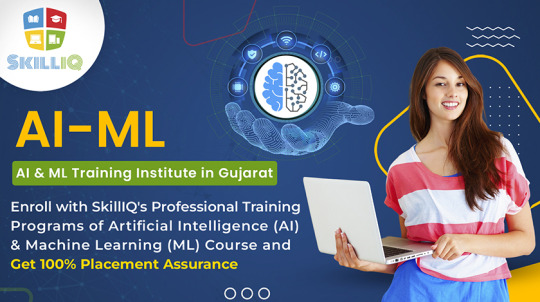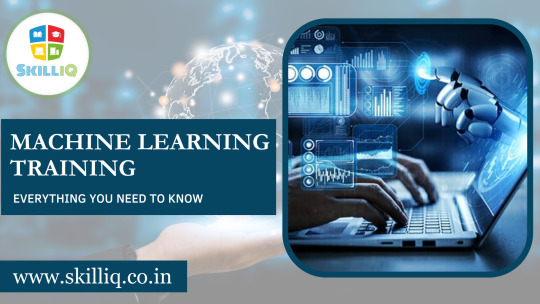#artificial intelligence course in india
Explore tagged Tumblr posts
Text
Dr. Prakarsh Singh | UG Program Chair, Plaksha
Dr. Prakarsh Singh is the Chair Professor of Economics at Plaksha University. He was a science leader and senior economist at Amazon with work spanning subscription modelling, global talent management and streaming businesses to develop strategic insights in competition, pricing and marketing.
#Plaksha University#Talent Management#b tech#artificial intelligence course in india#plaksha fellowship
0 notes
Text
Artificial Intelligence & Machine Learning’s Future Contribution

It is sometimes included together with Deep Learning, a recent branch of machine learning research. However, given the cutting-edge research taken on in the field of Deep Learning in particular, it is crucial for all AI enthusiasts to comprehend and stay up to date with the goal of bringing Machine Learning closer to one of its original goals Artificial Intelligence.
The main applications of data in the world we live in today are artificial intelligence and machine learning. Due to this, machine learning is one of the most in-demand fields today, and there is a significant demand for people in the field with the necessary knowledge, training, and practical experience. Great Lakes Post Graduate Program in Machine Learning was created with the express purpose of educating professionals in technologies and techniques used in the real world of business.
What is Artificial Intelligence & Machine Learning?
Artificial Intelligence, which includes replicating cognitive processes like perception, learning, and trouble, is a broad term for systems and algorithms that can emulate human intelligence. Deep learning (DL) and machine learning are branches of AI.
Advanced web search engines, voice-activated personal assistants, self-driving cars, and recommendation systems like those used by Spotify and Netflix are some examples of practical uses of AI.
Artificial Intelligence:
The study of intelligent machines that behave like people is the focus of the computer science field known as artificial intelligence or AI. The process of building intelligent machines, often referred to as smart machines, is intended to help in decision-making, which is carefully examined using data that is readily available within an enterprise. It functions in a similar way to how people do when combining information and coming to logical conclusions. However, in this case, the choice was taken after carefully examining a lot of information.
Machine Learning Work:
A subfield of artificial intelligence known as “machine learning” enables computers to learn and grow without being explicitly programmed. Students who pursue courses in machine learning know how to build automatically adapting computer systems by fusing data mining algorithms models.
Why Study AI & ML?
It will be very helpful to combine artificial intelligence, machine learning, and deep learning since they add a lot of value to the present process and offer intelligent directions for people to follow. The top applications for artificial intelligence & machine learning available that are now in use and have shown to be more effective and accurate for career growth. Choosing AI & ML Training Programs in Gujarat can be more beneficial for anyone’s career development.
Benefits of AI & ML Courses
Along with AI, ML is the gasoline we need to power robots. We can use ML to power applications that are easily updated and changed to adapt to new surroundings and tasks — getting things done quickly and effectively.
Studying AI And Machine Learning Promises A Bright Career
Learning Helps You Make A Good Living
Artificial Intelligence And Machine Learning Are A Versatile Discipline
Artificial Intelligence And Machine Learning Is The Skill Of The Century
Capable Of Ingesting A Huge Amount Of Data
Helps In Times Of Disasters
Big Bright Career
The Skill of the Century
Artificial Intelligence & Machine Learning’s Future Contribution
The application of machine learning extends beyond the world of investments. Instead, it is growing in all industries, including banking and finance, IT, media & entertainment, gaming, and the auto sector. There are several sectors where academics are trying to revolutionize the world for the future because the reach of machine learning is so broad. Let’s go over them in more depth.
Robotics
One of the disciplines that consistently captures the attention of both researchers and the general public is robotics. George Devol created the first programmable robot in 1954, which he called Unimate. After that, Hanson Robotics produced Sophia, the first AI robot, in the twenty-first century. Artificial Intelligence and Machine Learning made it feasible for these inventions.
The Quantum Computer
The field of machine learning is still in its infancy. There are many improvements that may be made in this area. Quantum computing is one of many that will advance machine learning. It is a sort of computing that makes use of the entanglement and superposition mechanical properties of quantum mechanics. We can construct systems (quantum systems) that can exhibit several states simultaneously by leveraging the quantum phenomena of superposition. Entanglement, on the other hand, is the situation in which two dissimilar states can be referred to one another. It aids in expressing the relationship between a quantum system’s attributes.
Why Enroll with SkillIQ?
Information Technology training has been provided to students, interns, freshers, and those who want to pursue careers in the IT industry by SkillIQ, a professional IT training institute, and incubator. They might hone their IT skills and perform at their peak on the job. We have developed professional training programs for students and interns with the appropriate credentials and real-world experience through internships and online training. The best and most knowledgeable group of mentors from the real world teaches aspirants through professional programs and cutting-edge teaching methods.
Would you be open to enrolling in an AI & ML training program? If so, you’ve come to the correct spot because SkillIQ offers Best AI and ML Training with placement guarantees in Gujarat.
https://www.skilliq.co.in/blog/post-graduate-programme-in-artificial-intelligence-and-machine-learning/
For detailed inquiry Contact us at +91 7600 7800 67 / +91 7777–997–894 Email us at: [email protected]
#artificial intelligence course in ahmedabad#artificial intelligence institute in india#machine learning training#machine learning certification#machine learning courses
2 notes
·
View notes
Text
Enhance Your Career with an MBA in Dubai

In today’s competitive job market, obtaining an MBA can significantly enhance your career prospects. Dubai, known for its vibrant economy and diverse business landscape, has emerged as a prime destination for pursuing an MBA. With numerous reputable business schools in Dubai offering innovative programs, professionals can gain the skills and knowledge necessary to excel in their careers.
Why Choose an MBA in Dubai?
Dubai’s strategic location as a global business hub makes it an ideal place for aspiring leaders to pursue their MBA. The city is home to various multinational corporations and startups, providing students with ample networking opportunities and exposure to real-world business challenges. Additionally, the multicultural environment fosters collaboration and learning from peers with diverse backgrounds.
Top Business Schools in Dubai
Several prestigious institutions offer MBA programs tailored to meet the needs of working professionals. Some of the top business schools in Dubai include:
INSEAD: Known for its rigorous curriculum and international faculty, INSEAD offers a one-year MBA program that emphasizes leadership and entrepreneurship.
American University in Dubai (AUD): AUD provides a flexible MBA program that allows students to specialize in areas such as finance, marketing, and management.
University of Wollongong in Dubai (UOWD): UOWD’s MBA program focuses on developing critical thinking and strategic decision-making skills essential for today’s business environment.
Hult International Business School: Hult offers a global perspective on business education with its unique curriculum that includes practical projects and international study options.
Benefits of Pursuing an MBA
Career Advancement: An MBA can open doors to higher-level positions within organizations. Graduates often find themselves qualified for roles such as management consultants, financial analysts, or even executive positions.
Networking Opportunities: Studying at a business school in Dubai allows students to connect with industry leaders, alumni, and fellow students who can provide valuable insights and opportunities throughout their careers.
Skill Development: The comprehensive curriculum of an MBA program equips students with essential skills such as leadership, strategic thinking, financial analysis, and effective communication—skills that are highly sought after by employers.
Global Perspective: Many programs emphasize international business practices, preparing graduates to navigate the complexities of global markets effectively.
Conclusion
Pursuing an MBA in Dubai is not just about earning a degree; it’s about enhancing your career trajectory through quality education and invaluable experiences. With numerous esteemed business schools offering diverse programs tailored to various professional goals, aspiring leaders have the opportunity to thrive in one of the world’s most dynamic cities. Whether you aim to climb the corporate ladder or start your own venture, an MBA from a reputable institution in Dubai can be a transformative step toward achieving your career aspirations.
#mba school#mba in finance#mbacollege#mba#mba in india#online mba#mba colleges#mba in dubai#ai course#artificial intelligence
0 notes
Text
Woxsen University is recognized as one of the top B.Tech colleges in India, offering cutting-edge programs in engineering and technology. Its B.Tech curriculum is designed to equip students with technical expertise and problem-solving skills through a blend of theoretical knowledge and practical application. Woxsen provides specializations in Artificial Intelligence, Data Science, and other emerging fields, ensuring that graduates are industry-ready. The university’s state-of-the-art labs, experienced faculty, and industry partnerships create a learning environment that fosters innovation and career success.

#b tech course fees#top B.Tech colleges in India#B.Tech in computer science engineering#B.Tech CSE data science#B.Tech in artificial intelligence and machine learning#B.Tech in electronics and communication engineering#private colleges for btech
0 notes
Text
Driving Business Transformation with Data Science: Case Studies and Insights

#Data Science Colleges in India#Business Growth#Data Science Management#Data Science Course#Industry Case Studies#Data Analytics#Artificial Intelligence#Emerging Technologies#Big Data
1 note
·
View note
Text

Enroll in a comprehensive Data Science and AI course to gain expertise in machine learning, deep learning, data analysis, and more. Learn from top instructors with real-world projects and career support!
#data science and ai course#data science course india#data science course with placement#best institute for data analyst course#data science training institute#online data science course in india#best institute for data science course#artificial intelligence course in pune#data science course in mumbai#data science course in hyderabad
0 notes
Text
AI Certification Courses Online: Your Gateway to the Future
Elevate your career with our comprehensive AI Certification Courses Online. Gain in-demand skills in machine learning, deep learning, and natural language processing. Learn from industry experts and earn certifications recognized by top employers.
https://sites.google.com/view/buy-ai-courses/
#AI Certification Courses Online#ai courses online#ai and mi courses#artificial intelligence#ai and ml courses in india
0 notes
Text
How AI is Shaping the Future of Remote Work and Collaboration
The world of work has undergone significant changes in recent years, with remote work becoming the norm for many professionals. At the heart of this transformation is Artificial Intelligence (AI), which is enhancing the way we collaborate and communicate across virtual spaces. Whether you're a student at St. Mary's Group of Institutions, where CSE-AIML is at the core of your studies, or a professional working remotely, understanding how AI is transforming collaboration tools is crucial for future success.
This blog delves into how AI is reshaping the future of remote work, making it more efficient, seamless, and productive for teams working from anywhere in the world.
The Rise of Remote Work
The shift toward remote work has been accelerated by technological advancements, the need for flexible work environments, and global events like the COVID-19 pandemic. As more companies and organizations adopt remote work policies, the demand for effective collaboration tools has soared.
Today, remote teams rely heavily on digital platforms for communication, project management, and teamwork. The challenge, however, is ensuring that these tools can handle the complexities of a distributed workforce while maintaining productivity and engagement. This is where AI comes in.
AI-Driven Collaboration Tools
AI is transforming remote work by offering tools that simplify workflows, automate tasks, and improve decision-making. Here’s how AI is driving the future of collaboration:
1. Intelligent Communication Platforms
One of the most significant advancements in remote work is the evolution of communication platforms powered by AI. AI tools can automatically transcribe meetings, summarize conversations, and even provide real-time language translations, enabling teams from different backgrounds to collaborate effortlessly.
For example, AI-driven chatbots are being used to answer routine questions, schedule meetings, and manage tasks without requiring human input. This saves time, allowing employees to focus on higher-priority tasks.
2. Automated Scheduling and Task Management
Managing calendars and coordinating schedules can be a time-consuming task for remote teams. AI is making this process simpler by integrating with calendar apps and automating meeting schedules. By analyzing the availability of team members, AI-powered scheduling tools can find the best times for meetings, avoiding the endless back-and-forth emails.
Moreover, AI can automatically assign tasks based on team members’ expertise and workload, ensuring optimal distribution of work without manual intervention. This ensures that projects move forward efficiently and that team members can focus on completing high-value tasks.
3. Enhanced Virtual Meetings
Virtual meetings are a cornerstone of remote work, and AI is improving their effectiveness in several ways. With the help of AI, virtual meetings can be more organized, inclusive, and productive.
AI can automatically generate summaries of meetings, highlight key points, and even suggest follow-up actions. AI-based virtual assistants can also help with meeting preparation by suggesting relevant documents, pulling up past discussions, and ensuring all team members are on the same page. This is particularly beneficial in environments where teams are spread across different time zones.
4. Smarter File Sharing and Collaboration
When working remotely, teams often need to share and collaborate on documents in real-time. AI is optimizing file-sharing systems by offering features like automatic version control, real-time collaboration, and intelligent document categorization.
AI-powered tools can also recommend the right files based on the context of the conversation or project, making it easier for team members to find relevant information. This not only saves time but also helps improve decision-making by ensuring that the right data is always at hand.
AI for Enhancing Team Collaboration and Engagement
AI isn't just about making individual tasks easier—it also plays a crucial role in enhancing collaboration and engagement among remote teams.
1. Personalized Collaboration Experiences
AI can adapt to the needs and preferences of individual team members. For instance, AI-driven collaboration tools can suggest content or tools that best suit a team member's working style, preferred communication methods, and past projects. This ensures that the collaboration experience is tailored to each individual’s needs, fostering greater engagement.
2. Predictive Analytics for Decision Making
AI can help remote teams make more informed decisions by analyzing vast amounts of data. Predictive analytics, powered by AI, can process historical data to forecast potential challenges and suggest actions. This gives teams a competitive edge, allowing them to make decisions based on data-driven insights rather than intuition.
For example, AI can analyze project performance, predict delays, and suggest ways to streamline workflows. In a remote environment, this is particularly useful for maintaining project timelines and ensuring that goals are met.
3. Boosting Team Morale with AI-Driven Feedback
AI can also be used to improve employee engagement and morale. AI-powered tools can collect feedback from team members and provide real-time analysis to managers. This allows companies to better understand the needs and concerns of remote workers and address them proactively.
For example, AI-driven pulse surveys can gauge team sentiment and provide insights into how the team is feeling about ongoing projects or workloads. This fosters a positive work environment, which is essential for the success of remote teams.
The Role of AI in Managing Remote Work Challenges
While remote work offers numerous benefits, it also comes with challenges such as communication barriers, isolation, and difficulties in managing productivity. AI is helping to address these issues in the following ways:
1. Overcoming Communication Gaps
Miscommunication is one of the biggest challenges of remote work. AI helps bridge communication gaps by providing real-time translations, transcription services, and content summarization. This makes it easier for remote teams to understand each other, regardless of language or cultural differences.
2. Monitoring Productivity and Well-being
AI tools can track productivity and identify potential burnout signs by analyzing work patterns. These tools can suggest breaks, recommend activities for relaxation, or provide resources for maintaining a work-life balance. Such proactive measures help remote employees stay focused, engaged, and avoid stress.
3. Security and Privacy in Remote Work
With more remote work comes an increased risk of data breaches and cyber threats. AI plays a vital role in enhancing the security of remote work environments by monitoring for unusual activity, identifying potential vulnerabilities, and automating security processes. This ensures that teams can collaborate securely without compromising sensitive data.
Conclusion
AI is no longer a futuristic concept but an integral part of the modern remote work environment. By enhancing communication, collaboration, and productivity, AI-powered tools are helping remote teams work more effectively and efficiently. For students pursuing CSE-AIML at St Mary's Group of Institutions, Best Engineering College in Hyderabad, understanding the role of AI in shaping the future of work is crucial.
As AI continues to evolve, it will undoubtedly play an even bigger role in the way we work, collaborate, and communicate in remote environments. Embracing this technology is not only beneficial for today’s workforce but is also essential for shaping the careers of tomorrow’s leaders in AI and machine learning.
0 notes
Text
Revolutionizing Anesthesiology Residency Education: How Technology is Shaping the Future of Training

The landscape of medical education has been changing drastically. Top anesthesia residency programs have been embracing cutting-edge technologies to transform how we educate the next generation of healthcare professionals. There is probably no field more vividly where this revolution is apparent than in the confluence of radiology and anesthesia training.
The Digital Revolution in Anesthesiology Training
The infusion of Artificial Intelligence has brought unprecedented revolutions in the way anesthesia residents learn and practice. The conventional methods are revolutionizing with:
Virtual Reality Simulations
Advanced procedural training
Risk-free learning environments
Real-time feedback systems
AI-Powered Learning Platforms
Personalized learning paths
Performance analytics
Adaptive curriculum design
Innovation in Best Anesthesia Residency Programs
The anesthesia residencies, as of the present, are based on innovation in technology. The latest approach of using digital platforms to apply advanced clinical principles has created new doors to:
Enhanced learning experiences
3D anatomical modeling
Interactive case studies
Remote learning capabilities
Improved Patient Safety
Advances in monitoring technology
Analytics predictive in nature
Risk assessment tools
Convergence of Theory and Practice
Modern anesthetic residency programs embrace a technologically advanced organization that bridges the gap between theoretical know-how and practical application. Some of the inclusions are:
Advanced Simulation Centers
High fidelity patient simulators
Crisis management scenarios
Team-based learning exercises
E-Learning Resources
Digital Learning Resources
Mobile learning platforms
Cloud-based collaboration
Live mentee systems
Artificial Intelligence in Clinical Practice
Rise of AI in healthcare: The way anesthesia residents approach patient care has changed completely. Some of the important developments include:
Diagnostic Assistance
Automated image analysis
Pattern recognition
Decision support systems
Treatment Planning
Personalized care protocols
Risk stratification
Outcome prediction
Advance Solutions in the Digital Era
Change in anesthesia training presents advanced solutions in training. Modern programs have incorporated the following:
Interactive learning modules
Evidence-based protocols
Interdisciplinary approach to collaboration
Hands-on application
Readiness for Tomorrow
The best anesthesia residency programs are designed toward preparing residents to be ready for new challenges. It seems that these good residency programs believe in changing some of the following to develop them:
Advanced Technical Training
Integration of emerging technology
Development of digital literacy
Nurture an innovation mentality
Comprehensive Skill Development
Practice in the clinical environment
Technical competencies
Professional adaptability
Conclusion: Embracing the Future of Medical Education
There can't be a more transformational juncture of healthcare history than the point when technology finally integrates into medical education. Because, anesthetics as a residency program is evolving day by day. Electronic tools and Artificial Intelligence are imperative to proceed in the field.
The future of anesthesia training lies in harnessing these technological advances while maintaining the human element of patient care. With innovative approaches and practical training, we are preparing the next generation of medical professionals for the challenges and opportunities that lie ahead.
Ready to Join the Future of Healthcare?
Supercharge your learning journey with Conceptual Anesthesia rich content:
Get Unlimited Access With Our Premium Membership
Complete Learning Resources:
Clinical Examination and Demonstration
Theory Notes & Discussions
DNB OSCE Sessions
Conceptual Anesthesia Books (Hardcopy)
Expert-Led Learning:
Live Sessions by Legendary Facultie
s on Important & Rare Cases
Live MCQ Discussions for SS Exams
Exam Preparation:
Solved Question Papers
Question Bank to practice MCQs for SS Exams
Pearls to Revise Important & High Yield Points
More Benefits:
Updates on the latest technology in anesthesia
Exclusive Webinars
Community support by other anesthesia residents
Many more!
Start Your Road to Excellence NOW!
Subscribe now: Membership Link
Download our app: App Link
Follow us: Social Media Links
Be part of the community of excellence in anesthesia practice. Your success story begins here!
#anesthesiology residency#anesthesiology residency programs#anesthesiology residents#best anesthesiology residencies#best anesthesiology residency programs#Artificial intelligence#technology#anesthesiology training#Anesthesia residents#anaesthesia resident#anaesthesiology residency#anaesthesia residency#Anesthesia Residency#anesthesia residency programs#anesthesia residents#best anesthesia residencies#best anesthesia residency programs#anaesthesia residents programs#Anesthesiology Residency Program#anesthesiology residency fellowship#anesthesiology residency fellowship programs#anesthesia residency fellowship programs after md#fellowship after md anaesthesia#fellowship after md anaesthesia in india#fellowship courses after md anaesthesia
0 notes
Text
Innovative Learning at Achievers IT

In the rapidly evolving world of technology, staying ahead of the curve is essential. Achievers IT is at the forefront of this innovation, offering cutting-edge courses and training programs designed to equip students with the skills they need to succeed. One of our standout offerings is the Artificial Intelligence Course, which provides comprehensive training in one of today's most exciting and fast-growing fields.
At Achievers IT, we believe that learning should be a dynamic and engaging process. Our curriculum is designed to not only impart theoretical knowledge but also to provide hands-on experience through real-world projects and case studies. This approach ensures that our students are not just passively absorbing information but actively applying what they learn in practical scenarios.
Our Artificial Intelligence Course is a perfect example of this innovative learning methodology. Students are introduced to the fundamentals of AI, including machine learning, neural networks, and deep learning, and then guided through advanced topics and applications. By the end of the course, students have the skills and confidence to tackle complex AI challenges in the industry.
What sets Achievers IT apart is our commitment to excellence in education. Our instructors are industry experts with extensive experience and a passion for teaching. They bring their real-world insights into the classroom, providing students with up-to-date knowledge and skills that are highly relevant in today's job market.
Moreover, we understand the importance of flexibility in learning. That's why our Artificial Intelligence Course is available in various formats, including online and in-person classes, allowing students to choose the option that best fits their schedule and learning preferences.
At Achievers IT, we are dedicated to transforming education and empowering our students to achieve their career goals. Join us and experience the future of learning today. Enroll in our Artificial Intelligence Course and take the first step towards a successful career in the exciting field of AI.
#artificial intelligence training#artificial intelligence courses in india#artificial intelligence classes#artificial intelligence course#artificial intelligence course online
0 notes
Text
youtube
Robots For Real World | Webinar by Dr Sandeep Manjanna
This talk explores real-world robotics applications, highlighting how robots are evolving beyond labs and sci-fi scenarios. It covers various types of robots—underwater, surface, drones, medical, and industrial—demonstrating their role in solving real-world challenges like environmental monitoring, precision agriculture, and healthcare. The speaker shares personal experiences working on amphibious robots, forestry drones, and autonomous surface vehicles, emphasizing the potential of robotics in improving ecosystem health, such as monitoring coral reefs affected by climate change.
#Plaksha#b tech#engineering#plaksha fellowship#plaksha tech leaders fellowship#artificial intelligence course in india#plaksha university#Youtube
0 notes
Text
Discover the Best BCA Colleges in Chandigarh: Your Path to a Successful Tech Career
Chandigarh, known for its well-planned infrastructure and educational institutions, is a hub for students aspiring to build a career in technology. Among the various programs offered, the Bachelor of Computer Applications (BCA) stands out as a popular choice for those passionate about computers and software development. If you're looking to pursue a BCA degree, Chandigarh offers some of the best colleges that provide quality education, industry exposure, and excellent placement opportunities.
Why Choose Chandigarh for Your BCA Studies? Educational Hub: Chandigarh is home to some of the top educational institutions in India, offering a conducive environment for academic growth.
Industry Exposure: The city has a growing IT sector, providing students with ample opportunities for internships, projects, and placements in leading tech companies.
Experienced Faculty: BCA colleges in Chandigarh boast experienced faculty members who are experts in their fields, ensuring that students receive a comprehensive education.
Modern Infrastructure: Colleges in Chandigarh are equipped with state-of-the-art facilities, including computer labs, libraries, and digital classrooms, providing students with the best learning environment.
BCA Course Structure and Curriculum The BCA program in Chandigarh colleges typically spans three years and is divided into six semesters. The curriculum is designed to provide a strong foundation in computer science and its applications. Here’s an overview of the subjects covered:
Programming Languages: C, C++, Java, Python, etc. Database Management: SQL, Oracle, etc. Web Development: HTML, CSS, JavaScript, etc. Software Engineering: Software development life cycle, project management. Data Structures: Concepts of data organization, algorithms. Operating Systems: Windows, Linux, etc. Networking: Basics of networking, network security. Mathematics for Computing: Discrete mathematics, statistics.

#college#bca college#bca#bca course#india#mbacollege#artificial intelligence#edtech#education#student#school#robotics#uttaranchaluniversity
0 notes
Text
Which MBA program is most effective for securing a job in Dubai?
While there are several excellent options available for pursuing an MBA in UAE, programs offered by institutions like INSEAD Middle East Campus, AUD, UOWD, DBS, and Hult International Business School stand out due to their strong reputations and connections within the region’s job market.
#mba colleges#mba in dubai#online mba#mba school#mba in finance#mbacollege#mba#mba in india#ai course#artificial intelligence
0 notes
Text
How To Get A Machine Learning Certification Course Online?
For Quick Enquiry: Click Here

Introduction: Embarking on the Journey to a Machine Learning Certification Course Online
In today's tech-driven world, Machine Learning (ML) has become a game-changer. Whether it's self-driving cars, personalized recommendations, or even your phone's voice assistant, ML is behind it all. Naturally, the demand for professionals skilled in this domain is skyrocketing. For those aiming to break into this field, obtaining a certification is a crucial first step. This is where a comprehensive AI Intelligence Course in Noida can come into play, offering the knowledge and credentials needed to stand out in a competitive job market.
Finding the right online course to get certified in ML can be overwhelming. With so many options out there, how do you choose the one that suits your goals? Do you go for a short-term course or a more intensive one? And what about the credibility of the certification? These are the questions that often swirl in the minds of aspiring ML professionals. Fear not! This blog will guide you through the essential steps to getting a machine learning certification online, making sure you don't get lost in the sea of choices.
In this guide, we will explore how to select the best online Artificial Intelligence Institute In Delhi, understand the prerequisites, and ensure that you gain the right skills to excel in the ML field. If you're looking to jump-start your ML career from the comfort of your home, read on to find out how you can achieve your certification goals efficiently and effectively.
Choosing the Right Machine Learning Certification Course
1. Understanding the Different Types of Machine Learning Courses Available Online
The first step in obtaining a machine learning certification is understanding the different types of courses available online. Machine learning courses can range from beginner to advanced levels, and they often focus on various aspects of ML, such as supervised learning, unsupervised learning, or deep learning.
It's essential to assess your current skill level before enrolling in a course. If you're just starting, look for courses that offer a solid foundation in the basics of machine learning. These introductory courses typically cover essential topics such as linear regression, classification algorithms, and data preprocessing. On the other hand, if you already have some experience, you might want to consider more specialized courses that delve into advanced topics like neural networks or reinforcement learning.
For those aiming to find the best courses, searching for an Artificial Intelligence And Machine Learning Course in Noida online can lead you to well-structured programs tailored to different skill levels. Just like how you wouldn’t dive into deep waters without learning to swim first, starting with the right course level will ensure you build a strong foundation before tackling more complex concepts.
2. Evaluating Course Content, Structure, and Certification Credibility
Once you have a clear understanding of the types of courses available, the next step is to evaluate the course content, structure, and credibility of the certification. A good machine learning certification course should offer a well-rounded curriculum that covers both theoretical concepts and practical applications.
Look for courses that include hands-on projects, case studies, and real-world examples. These elements not only make learning more engaging but also provide practical experience that can be invaluable when applying for jobs. Additionally, ensure that the course offers a recognized certification upon completion. Certification from reputable platforms like Coursera, edX, or Google can add significant value to your resume.
Finding an Artificial Intelligence Institute In Delhi that offers a balance between theory and practice is key to getting the most out of your learning experience. Consider the credibility of the platform and the instructors as well. After all, you wouldn’t want to invest time and money into a course only to find out that the certification holds little weight in the industry.
3. Considering Course Duration, Flexibility, and Cost
Another crucial factor to consider when choosing an online machine learning certification course is the duration, flexibility, and cost. Depending on your current commitments, you may prefer a self-paced course that allows you to study at your own pace or a more structured program with set deadlines. Additionally, the duration of the course can vary significantly, from short-term courses lasting a few weeks to comprehensive programs that take several months to complete.
When searching for an AI Intelligence Course in Noida, make sure to choose one that fits your schedule and budget. While some courses are free, others may require a significant financial investment. It's essential to weigh the cost against the potential benefits of the certification. Remember, just like investing in quality ingredients can lead to a delicious meal, investing in the right course can lead to a successful career in machine learning.
Preparing for the Course and Maximizing Learning
1. Ensuring You Meet the Prerequisites Before Enrolling in the Course
Before diving into an Artificial Intelligence Institute In Delhi, it's crucial to ensure that you meet the prerequisites. Many machine learning courses require a basic understanding of programming, particularly in languages like Python or R, as well as a solid grasp of mathematics, including linear algebra and statistics. If you're new to programming or math, consider taking introductory courses in these subjects before tackling machine learning.

Fulfilling the prerequisites will not only make the learning process smoother but also allow you to get the most out of the course content. Think of it as making sure you have all the ingredients before starting to cook a complicated recipe—you don't want to be halfway through only to realize you're missing something essential.
2. Utilizing Additional Resources to Enhance Your Learning Experience
While a good Artificial Intelligence And Machine Learning Course in Noida will provide you with the necessary knowledge, it's always a good idea to supplement your learning with additional resources. Online communities, forums, and study groups can provide valuable insights and support as you progress through the course. Websites like Stack Overflow, GitHub, and Medium often have articles, tutorials, and discussions that can help you deepen your understanding of machine learning concepts.
In addition to online resources, consider reading books or watching tutorials to reinforce what you've learned. Engaging with different learning formats can help solidify your understanding and provide new perspectives on the material. Just like seasoning a dish enhances its flavor, utilizing additional resources can enrich your learning experience.
3. Gaining Practical Experience Through Projects and Challenges
One of the best ways to solidify your machine-learning knowledge is by applying it to real-world problems. Many online courses include projects as part of the curriculum, but it's also beneficial to seek out additional challenges on your own. Platforms like Kaggle and DrivenData offer competitions and datasets that allow you to test your skills and work on real-world problems.
Participating in these challenges not only helps you gain practical experience but also builds your portfolio, which can be a valuable asset when applying for jobs. If you're enrolled in an AI Intelligence Course in Noida, make sure to take full advantage of any project opportunities and seek out additional challenges to further enhance your skills.
Think of gaining practical experience as the final step in cooking a meal—you've prepared all the ingredients, followed the recipe, and now it's time to taste the finished product. By applying what you've learned to real-world problems, you'll be able to see the fruits of your labor and build the confidence needed to succeed in the field of machine learning.
Conclusion: Achieving Success with Your Machine Learning Certification Online
Embarking on the journey to obtain a machine learning certification online is an exciting and rewarding endeavor. By choosing the right course, evaluating the content, and ensuring it fits your schedule and budget, you set yourself up for success. Once enrolled, meeting the prerequisites and utilizing additional resources can further enhance your learning experience. Finally, gaining practical experience through projects and challenges will solidify your knowledge and provide a strong foundation for your future career in machine learning.
For those in India looking to get certified, enrolling in an Artificial Intelligence And Machine Learning Course in Noida is a valuable step toward becoming a skilled machine learning professional. With determination, continuous learning, and practical application, you'll be well on your way to achieving your certification goals and advancing your career in this dynamic and rapidly evolving field. So go ahead, take the plunge, and start your journey toward machine learning mastery today!
Also Read This:-
Top AI Training Institutes (Call Now @9510860860)
How To Find Out If AI Advancements In Retail Is A Good Career For Me?
#AI Classes#AI Intelligence Course#Artificial Intelligence Classes#Artificial Intelligence Course#Advanced Artificial Intelligence Course#AI Courses#AI Courses Online#Artificial Intelligence Online Course#Learn Artificial Intelligence Online#AI Full Course#Introduction To AI#AI And ML Courses#AI Beginner Course#AI Courses For Beginners#AI Machine Learning Courses#Artificial Intelligence And Machine Learning Course#Artificial Intelligence Course For Beginners#Machine Learning And AI Courses#AI ML Courses#Best Artificial Intelligence Course#Learn AI For Beginners#AI Certification Course#AI Learning Course#Artificial Intelligence Certification#Artificial Intelligence Training#AI Training Courses#Artificial Intelligence Training Institute#Best Artificial Intelligence Course In India#kvch#ArtificialIntelligence
0 notes
Text
Rise of AI Startups in India: Pioneering Innovation and Shaping the Future
Summary: In recent years, India has emerged as a dynamic hub for Artificial Intelligence (AI) startups, signaling a profound shift in the country's technological landscape. This burgeoning sector has not only attracted significant investments but also revolutionized various industries, promising transformative solutions across diverse sectors. This blog explores the journey of AI startups in India, their impact on different industries, the challenges they face, and their future prospects.

Introduction
Artificial Intelligence, once the domain of science fiction, has now become an integral part of our daily lives, reshaping how businesses operate and how consumers interact with technology. In India, the AI revolution is gaining momentum, driven by a confluence of factors including technological advancements, entrepreneurial spirit, and supportive government policies. This blog delves into the rise of AI startups in India, highlighting their role in shaping the future of innovation and economic growth.
The Rise of AI in India
India's journey into AI has been characterized by rapid growth and innovation. With a burgeoning tech-savvy population and a robust ecosystem of research institutions and engineering talent, India has positioned itself as a global AI powerhouse. The proliferation of AI applications in sectors such as healthcare, agriculture, finance, and e-commerce underscores the transformative potential of this technology.
Criteria for Ranking Top AI Startups
Innovation and Technology: Leveraging AI to create innovative solutions that address real-world challenges.
Market Potential: Identifying and tapping into high-growth markets both domestically and globally.
Team Expertise: Building teams with deep technical expertise and domain knowledge.
Funding and Support: Accessing venture capital, government support, and incubation programs.
Top AI Startups in India
Several AI startups in India have garnered attention for their innovative solutions and disruptive technologies. Top AI Startups like Yellow.AI, Aarya.AI, Machineack, Haptik and Pickl.AI, , have distinguished themselves by leveraging AI to address pressing challenges in sectors such as healthcare diagnostics, personalized e-commerce recommendations, smart agriculture solutions, and predictive analytics.
Impact of AI Startups on Various Sectors
AI startups in India have catalyzed transformation across sectors:
Healthcare: Improving diagnostics, personalized treatment plans, and patient care.
Finance: Enhancing fraud detection, credit assessment, and personalized financial advice.
E-commerce: Optimizing customer service, recommendation engines, and supply chain management.
Education: From online digital courses to virtual classrooms, AI in education has revolutionized conventional methods of learning. The EdTech industry with its immersive learning approach and business ideas have been adopting AI technology with significant benefits.
The integration of AI has not only enhanced efficiency but also revolutionized how businesses operate and serve their customers.
Challenges Faced by AI Startups in India
Despite their rapid growth, AI startups in India encounter several challenges:
Talent Acquisition: Competition for skilled AI professionals.
Regulatory Hurdles: Navigating regulatory frameworks around data privacy and AI ethics.
Funding Constraints: Accessing adequate funding for research and development.
Market Readiness: Educating potential customers about AI benefits and overcoming skepticism.
Addressing these challenges is crucial for sustaining growth and innovation in India's AI startup ecosystem.
Challenges Faced by AI Startups in India
Despite the promising growth prospects, AI startups in India encounter several challenges. These include access to skilled talent, regulatory complexities, data privacy concerns, and the need for substantial initial investments in research and development. Moreover, competing in a global AI landscape requires startups to navigate intellectual property rights and establish robust cybersecurity measures.
Future Prospects of AI Startups in India
Looking ahead, the future appears promising for AI startups in India:
Expansion into Global Markets: Scaling operations and exporting AI solutions worldwide.
Collaborations: Partnering with academia, corporates, and international counterparts for research and development.
Emerging Technologies: Integrating AI with blockchain, IoT, and quantum computing for enhanced capabilities.
With supportive government initiatives like Digital India and Startup India, AI startups are poised to lead India's technological evolution on a global scale.
Conclusion
In conclusion, the rise of AI startups in India represents a transformative shift towards innovation-driven economic growth. These startups are not only redefining traditional industries but also creating new avenues for employment and entrepreneurship. As AI continues to evolve, its integration into everyday life is set to redefine how businesses operate, how governments deliver services, and how societies interact with technology. With robust support from stakeholders and a commitment to overcoming challenges, AI startups in India are well-positioned to lead the global AI revolution, driving inclusive growth and sustainable development.
For those interested in delving deeper into AI and its applications, consider exploring AI courses that can equip you with the skills to navigate this exciting field.
Embrace the future with AI startups in India — where innovation meets opportunity.
#ai startups in india#top ai startups in india#top ai startups#ai startups#startups#ai#artificial intelligence#ai courses#data science#pickl.ai#data analyst
0 notes
Text
The Beginner's Guide to Machine Learning Training: Everything You Need to Know

Welcome to the exciting world of machine learning! Whether you're a curious beginner or someone looking to dive into the realm of artificial intelligence, understanding the basics of machine learning training is a crucial first step. In this beginner's guide, we'll break down the essentials to help you navigate the complex landscape of machine learning.
Understanding Machine Learning: Machine learning is a subset of artificial intelligence that enables computers to learn and make predictions or decisions without explicit programming. At its core, machine learning involves the use of algorithms and statistical models that allow systems to improve their performance over time.
Types of Machine Learning: There are three main types of machine learning: supervised learning, unsupervised learning, and reinforcement learning. Supervised learning involves training a model on a labeled dataset, unsupervised learning deals with unlabeled data, and reinforcement learning focuses on training models through a system of rewards and punishments.
The Training Process: Machine learning models "learn" through a training process where they are exposed to data, make predictions, and adjust their parameters to minimize errors. This iterative process continues until the model achieves the desired level of accuracy.
Data is King: The quality of the data you feed into your machine learning model is paramount. Clean, relevant, and representative datasets are essential for training accurate models. Preprocessing steps such as cleaning, normalization, and feature engineering play a crucial role in shaping the success of your model.
Choosing the Right Algorithm: Different machine learning algorithms serve various purposes. Choosing the right algorithm depends on the nature of your problem—whether it's a classification, regression, clustering, or other tasks. Popular algorithms include linear regression, decision trees, support vector machines, and neural networks.
Validation and Testing: To ensure the generalization ability of your model, it's essential to split your dataset into training, validation, and testing sets. Training data is used to teach the model, the validation set helps fine-tune parameters, and the testing set evaluates the model's performance on new, unseen data.
Model Evaluation Metrics: Determining the success of your model involves using appropriate evaluation metrics. Accuracy, precision, recall, F1 score, and area under the ROC curve are common metrics used to assess model performance, depending on the type of problem you are solving.
Conclusion:
Embarking on the journey of machine learning training is an exhilarating venture. Equipped with a solid foundation in the fundamentals, you are now better prepared to delve into the expansive realm of artificial intelligence. Enter SkillIQ's Machine Learning Training – your dedicated pathway to mastering the art of AI. Specifically designed for beginners and those aspiring to become adept data scientists, this course encompasses the essential elements of machine learning.
#artificial intelligence course in ahmedabad#artificial intelligence institute in india#machine learning course#machine learning certification#machine learning courses#machine learning training#ml course#machine learning syllabus#machine learning certification course
0 notes